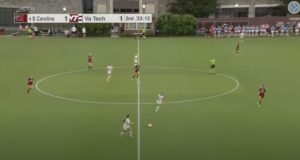Former Virginia Tech Hokies soccer player Kiersten Hening was allegedly benched for refusing to take a knee during the playing of the Star-Spangled Banner. Although other athletes on the team followed the woke trend of kneeling during the national anthem, Hening refused to comply and claimed to have been taken off the field of play as a result. But would her claim be strong enough to hold up in a court of law?
Now, United States District Judge Thomas T. Cullen has approved Hening’s opportunity to sue Virginia Tech. Hening claims that her freedom of speech was violated when she refused to take a knee during the national anthem despite being one of the only players to refuse to do so. She did not want to show her support for the Black Lives Matter movement or protest police brutality against people of color in the country.

Hening claims that her freedom of speech was violated by Virginia tech soccer head coach Charles Adair (below) when he benched Hening following her failure to join the team’s “unity statement” of kneeling during the playing of the Star-Spangled Banner back during a game in 2020.

Hening filed a lawsuit against Virginia Tech and Coach Adair the following year in 2021, but Virginia Tech used its team of legal authority to try to get the lawsuit thrown out. They filed a motion to dismiss the lawsuit, which delayed the process of them having to pay Hening any damages for violating her freedom of speech, allegedly.
Hening claimed that when she refused to show her support for the Black Lives Matter movement in 2020 by taking a knee during the national anthem, Coach Adir began to take her out of play. Hening also claimed that Coach Adir insulted her and demeaned her, in addition to limiting the time she played during official games.

Judge Cullen (above) stated, “Hening, who had been a major on-field contributor for two years prior to the 2020 season, also asserts that Adair removed her from the starting lineup or the next two games and drastically reduced her playing time in those games because she had engaged in this protected First Amendment activity. As a result, Hening resigned from the team after the third game of the season.”
“As a freshman,” he said in his memorandum, “Hening averaged 76 minutes of playing time; as a sophomore, nearly 88. But during the Clemson game [the next game after the kneeling incident], Hening only played 29 minutes, and, at the UNC game, just 5.”
Judge Cullen is a young white man. He also attested that Coach Adir seemed to single out Hening based on her anti-Black Lives Matter political views and not because she was a poor soccer player. Instead, she was taken off the field simply because she did not join her woke teammates by taking a knee during the national anthem.
Judge Cullen added, “For these reasons, the court will deny Adair’s motion for summary judgment, and this matter will proceed to trial.”





